|
DID
YOU KNOW.....
FOOTBALL & CRICKET
Football has a million
and one stories and just as many facts and figures. Here are a few of them
- the record-breaking, unusual and bizarre. More
Did You Knows...
Index
1 2
3 4
5 6 7
8 9
10 11
12 13
14 15
16 17
18 19
20
21 22
23 24
25 26
27 28
29 30
31 32
33
34
Its perhaps not the case so much now
but with seasons which hardly overlapped and a group of natural sportsmen
who needed to earn a decent living in both summer and winter it was
perhaps not surprising that many players once played both our national sports
- football and cricket - to a high standard. A dozen players have
represented England at both football and cricket and dozens more have
played both games to a high standard. Here are some of them -
Chris Balderstone was a true Roy of the Rovers
all-rounder. As a footballer he was signed by Bill Shankly for
Huddersfield Town in 1958 although one Denis Law kept him out of the first
team until the following year. He went on to play for Carlisle, Doncaster
and Queen of the South. At Carlisle he scored a penalty for the Cumbrians
against Spurs on Saturday August 24th 1974 - the only goal of the match
and a victory that put Carlisle on top of the old First Division for just
a few days.
Carlisle results/table 1974/75. As a cricketer he made his
debut for Yorkshire in 1961 before moving to another strong and successful
club, Leicestershire. He made two Test appearances for England and
following retirement he became a first-class umpire, officiating in two
one-day internationals. The two sports once famously combined to earn him
a bit of a 'Superman' reputation. On Monday 15th September 1975 he played
cricket for Leicestershire against Derbyshire at Chesterfield and at close
of play he was 51 not out. A quick drive to Belle Vue followed and he
played for Doncaster Rovers in the evening in a 1-1 draw against Brentford
in the Fourth Division. The following morning he was back playing cricket,
finishing his innings on 116 and taking 3 wickets for 28 runs to help win
the County Championship for Leicestershire for the first time. Amazing!
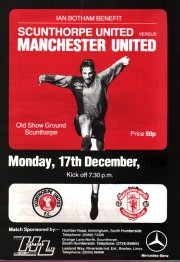 The
trick pub quiz question is - name the three England captains who have
played for Scunthorpe United? Kevin Keegan, Ray Clemence and....Ian Botham.
Former England cricketer Botham made his Football League debut for
Scunthorpe as a sub away to Bournemouth on Tuesday March 25th 1980, a 3-3
draw. He made his starting debut a couple of years later in Scunthorpe's
home match against Wigan on Friday March 12th 1982. A memorable match -
Scunthorpe lost 2-7, their worst home League defeat! In total Ian Botham
played 11 League games for Scunthorpe as a non-contract player and of
course with a record like that was awarded a benefit match....against
Manchester United! The
trick pub quiz question is - name the three England captains who have
played for Scunthorpe United? Kevin Keegan, Ray Clemence and....Ian Botham.
Former England cricketer Botham made his Football League debut for
Scunthorpe as a sub away to Bournemouth on Tuesday March 25th 1980, a 3-3
draw. He made his starting debut a couple of years later in Scunthorpe's
home match against Wigan on Friday March 12th 1982. A memorable match -
Scunthorpe lost 2-7, their worst home League defeat! In total Ian Botham
played 11 League games for Scunthorpe as a non-contract player and of
course with a record like that was awarded a benefit match....against
Manchester United!
Brothers Denis and Leslie
Compton had sport, and more particularly Arsenal and
Middlesex, in their genes. Leslie was the more successful
footballer of the two making a total of 253 League appearances for Arsenal
between 1932 and 1952 and playing twice for England. He was 38 years and
64 days old when he made his debut for England, against Wales in 1950,
making him the oldest-ever outfield England debuntant. Between 1938 and
1956 he kept wicket for Middlesex, playing a total of 274 first class
matches. Denis made 54 League appearances for Arsenal between 1936
and 1950 and played 12 times for England in war-time (unofficial)
internationals. Cricket was his main sport, making 78 Test appearances for
England while scoring 38942 runs and taking 622 wickets in a total of 515
first class matches played. The brothers played alongside each other in
Arsenal's League Championship successes of 1937/38 and 1947/48, in
Middlesex's County Championship triumph in 1947 and were both in the
Arsenal side that defeated Liverpool in the 1950 FA Cup Final at Wembley.
A remarkable family achievement.
Trevor Ford enjoyed his
cricket but his career was in football. A centre-forward, he played for
Swansea, Aston Villa, Sunderland, Cardiff, PSV Eindhoven and Newport
County as well as making 38 appearances for Wales. After retiring from
football he made a cameo appearance in a very famous County Championship
cricket match between Glamorgan and Nottinghamshire. On August 31st 1968
at the St Helen's ground in his home town of Swansea he made a brief
appearance for Glamorgan as a substitute fielder for the injured Ossie
Wheatley. Later that day Nottinghamshire's Gary Sobers became the first
person ever to score six sixes in one over, the unfortunate bowler being
Malcolm Nash.
The greatest all-rounder of them all
was CB Fry. An amateur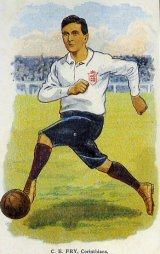 footballer, he played for the Corinthians as
well as a total of 18 Southern League matches for Southampton and
Portsmouth. While at Southampton he won an England cap against Ireland and
played for the Saints in the 1902 FA Cup final against Sheffield United,
who had 'Fatty' Foulke in their line-up. Two days after their replay
defeat in that final Fry scored 82 when opening the batting with WG Grace
for London County at the Oval. As a cricketer he made 26 appearances for
England and during his career scored 94 centuries. As well as being a
double international he held the world long-jump record for a while,
played for Blackheath and the Barbarians at Rugby Union, he was a writer,
edited his own magazines, broadcaster, unsuccessfully stood in three
General Elections, he met Hitler and was once reputedly offered the throne
of Albania. I bet I could have beaten him at WII ten pin bowling though! footballer, he played for the Corinthians as
well as a total of 18 Southern League matches for Southampton and
Portsmouth. While at Southampton he won an England cap against Ireland and
played for the Saints in the 1902 FA Cup final against Sheffield United,
who had 'Fatty' Foulke in their line-up. Two days after their replay
defeat in that final Fry scored 82 when opening the batting with WG Grace
for London County at the Oval. As a cricketer he made 26 appearances for
England and during his career scored 94 centuries. As well as being a
double international he held the world long-jump record for a while,
played for Blackheath and the Barbarians at Rugby Union, he was a writer,
edited his own magazines, broadcaster, unsuccessfully stood in three
General Elections, he met Hitler and was once reputedly offered the throne
of Albania. I bet I could have beaten him at WII ten pin bowling though!
Although born in Bury, Lancashire,
Andy Goram was a double international for Scotland. As a goalkeeper
he played 43 times for Scotland at football while at cricket he played
twice in first-class matches against Ireland and several times more in
one-day internationals. He was fined by his football employer, Hibs, for
playing in one of those matches, against the Australians in 1989, after being told not to do so to prevent possible injury. After his £1
million move to Rangers in 1991 he was effectively banned from playing
cricket to prevent a possible injury. In 2001 he was voted by Rangers fans
as the best ever Rangers goalkeeper and while at that club he picked up a
unique chant in his honour. Having been diagnosed with a mild case of
schizophrenia there was only one possible chant - 'Two Andy Gorams,
there's only two Andy Gorams!'
Geoff Hurst holds the record
as the only footballer to have scored a World Cup final hat-trick but he
also holds the record of being the only World Cup winner to have played
County Championship cricket. He did this just once - for Essex against
Lancashire at Liverpool in 1962 but also played 23 times for Essex 2nd XI
during the summers of 1962, 1963 and 1964.
Gary Lineker was another
sporting all-rounder. At cricket he captained Leicestershire Schools and played for
the County 2nd XI before concentrating on football. He later played for
the MCC against Germany at Lords in 1992 scoring a single run - 'I always score one against Germany' he said.
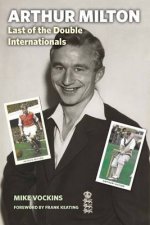 Arthur Milton was the last of
the England double internationals. He made
his international debut at football for England against Austria in 1951
after having played only 12 League matches for Arsenal. He retired from
football in the summer of 1955 after making a total of 89 League
appearances for the Gunners and Bristol City. He was also a
Gloucestershire cricketer from 1948 to 1974 and made 6 appearances for
England. He made a century on his England debut, against New Zealand at
Headingley in July 1958, opening the batting in that Test with another
double international MJK (Mike) Smith (cricket and rugby union). Arthur Milton was the last of
the England double internationals. He made
his international debut at football for England against Austria in 1951
after having played only 12 League matches for Arsenal. He retired from
football in the summer of 1955 after making a total of 89 League
appearances for the Gunners and Bristol City. He was also a
Gloucestershire cricketer from 1948 to 1974 and made 6 appearances for
England. He made a century on his England debut, against New Zealand at
Headingley in July 1958, opening the batting in that Test with another
double international MJK (Mike) Smith (cricket and rugby union).
Like the Comptons, the Nevilles would be part of any
argument that sporting excellence is in the genes. Dad Neville (yes his
name was Neville Neville) was a league cricketer in Lancashire while sons
Phil and Gary were England football internationals and their sister Tracey
an England netball international. Both brothers were talented youth
cricketers with Phil Neville being seen by many as a Test player of
the future. He captained England Under-15s, played alongside Andrew Flintoff
in the Lancashire Under-19 side and when just 15 he became the youngest
player to play for the Lancashire 2nd XI. Then he joined Manchester
United, but it wasn't a straightforward decision -
|
"My last ever game of
cricket was for Lancashire seconds. I got called in by my school and
they told me I was missing too much time. They said I had to give up
either football or cricket, but I had just played at Wembley against
an Italian team containing Totti so that swayed me. And Lancashire
didn't offer me anything either. In the end, my maths teacher helped
me make my decision." |
Ian Botham's Somerset team-mate
Viv Richards was a double World Cup international. He was a World Cup
winner for the West Indies at cricket but somewhat less successful when
playing football for Antigua in the 1974 World Cup qualifiers.
W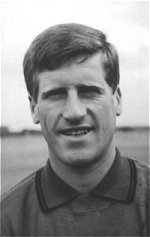 ith Moore, Hurst and Peters in the
side it would be easy to overlook the sporting prowess of the other
members of the West Ham United side of the mid-sixties. One of them was
goalkeeper Jim Standen. In 1964 he was part of the Hammers' side
that won the FA Cup for the first time and during the summer a member of
the Worcestershire side that won the County Championship, also for the first
time. His medium pace bowling saw him take 64 wickets at 13 runs each
(best performance 7-30) to finish top of the County Championship bowling
averages. In 1965 he was back at Wembley with the West Ham side that beat
Munich 1860 in the European Cup Winners Cup Final and although
Worcestershire retained their cricket title Standen played in only one of
their matches. ith Moore, Hurst and Peters in the
side it would be easy to overlook the sporting prowess of the other
members of the West Ham United side of the mid-sixties. One of them was
goalkeeper Jim Standen. In 1964 he was part of the Hammers' side
that won the FA Cup for the first time and during the summer a member of
the Worcestershire side that won the County Championship, also for the first
time. His medium pace bowling saw him take 64 wickets at 13 runs each
(best performance 7-30) to finish top of the County Championship bowling
averages. In 1965 he was back at Wembley with the West Ham side that beat
Munich 1860 in the European Cup Winners Cup Final and although
Worcestershire retained their cricket title Standen played in only one of
their matches.
*********
I started the above section by
saying that there was little overlap between the cricket and football
seasons - but sometimes what overlap there was did cause problems. Back in
the 1950s Ron Nicholls and Barrie Meyer where decent
footballers with Second Division Bristol Rovers. Barrie Meyer scored 60
goals in 139 League outings for Rovers while Ron Nicholls made 71 League
appearances as goalkeeper for the club. But they were also decent
Gloucestershire County cricketers - Nicholls was later part of
Gloucestershire's record wicket stand scoring 217 of the 395 partnership
score while wicketkeeper Meyer was to make 826 dismissals in 406 first
class matches for the County. The problem arose in the summer of 1958 when
both players refused to report back for the start of pre-season training
with Bristol Rovers and remained with Gloucestershire until the end of the
cricket season. Both were soon on the transfer list - Nicholls was
transferred to Cardiff City (he later played for Bristol City) while Meyer
moved on to Plymouth Argyle and later played for Newport County and
Bristol City.
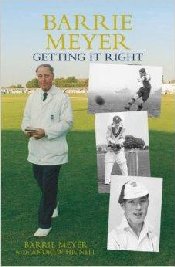 Both
Nicholls and Meyer were both members of the Bristol Rovers team that
recorded one of the clubs' greatest result - a 4-0 defeat of the Busby
Babes of Manchester United in the FA Cup in January 1956. The 35,872
Eastville crowd saw Meyer score one of those four goals and that highlight
in his football career was later matched in his cricket career when on his
retirement from playing he was appointed a Test match umpire, officiating
in 26 Tests. So he is has the distinction of being the only Test match
umpire to score an FA Cup goal against Manchester United - now that's a
quiz question if ever there was one! Both
Nicholls and Meyer were both members of the Bristol Rovers team that
recorded one of the clubs' greatest result - a 4-0 defeat of the Busby
Babes of Manchester United in the FA Cup in January 1956. The 35,872
Eastville crowd saw Meyer score one of those four goals and that highlight
in his football career was later matched in his cricket career when on his
retirement from playing he was appointed a Test match umpire, officiating
in 26 Tests. So he is has the distinction of being the only Test match
umpire to score an FA Cup goal against Manchester United - now that's a
quiz question if ever there was one!
Link -
FA Cup results 1955/56
*********
Sheffield United were
formed by Yorkshire Cricket Club in March 1889 just six days after Bramall
Lane had staged an FA Cup semi-final which had taken £600 in receipts. The
cricket club decided that regular football at the ground would prove
successful
(Bramall Lane). It did prove successful, so
much so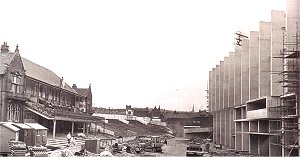 that the football club became the senior partner and eventually evicted
the cricket club from the ground. Yorkshire played their last County match
at Bramall Lane in August 1973, drawing with Leicestershire. The South
Stand at Bramall Lane was then built on part of the former cricket ground,
finally enclosing the football ground on all four sides.
that the football club became the senior partner and eventually evicted
the cricket club from the ground. Yorkshire played their last County match
at Bramall Lane in August 1973, drawing with Leicestershire. The South
Stand at Bramall Lane was then built on part of the former cricket ground,
finally enclosing the football ground on all four sides.
*********
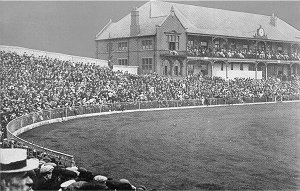 Yorkshire
staged 339 County Championship matches at Bramall Lane and in July 1902
became the only current Football League ground ever to host a Test Match, England
losing to Australia by 143 runs. However, with Bramall Lane suffering from
poor light because of the smoke emissions of local factories it proved to
be the only one the ground hosted. Pictured is the crowd at the Bramall
Lane Test showing the Pavilion in its hey-day, in contrast to the picture
above which shows the same Pavilion shortly before it was demolished to
make way for yet another car park. Yorkshire
staged 339 County Championship matches at Bramall Lane and in July 1902
became the only current Football League ground ever to host a Test Match, England
losing to Australia by 143 runs. However, with Bramall Lane suffering from
poor light because of the smoke emissions of local factories it proved to
be the only one the ground hosted. Pictured is the crowd at the Bramall
Lane Test showing the Pavilion in its hey-day, in contrast to the picture
above which shows the same Pavilion shortly before it was demolished to
make way for yet another car park.
*********
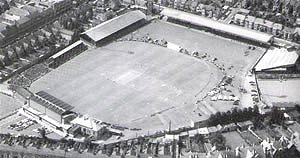 Following
the loss of cricket at Bramall Lane the last ground to host both Football
League and County Championship matches was the County Ground at
Northampton. Originally a cricket ground, Northampton Town were
residents of the County Ground from their formation in 1897. The football
pitch had the reputation of having the worst playing surface in the League
which was largely the result of the pitch being used as a spectator
area/car park/picnic area during the cricket season. The Cobblers played
their last match there on Tuesday October 11th 1994, a 0-1 Division 3
defeat by Mansfield. Four days later they drew 1-1 with Barnet in their
first match at the Sixfields Stadium. Following
the loss of cricket at Bramall Lane the last ground to host both Football
League and County Championship matches was the County Ground at
Northampton. Originally a cricket ground, Northampton Town were
residents of the County Ground from their formation in 1897. The football
pitch had the reputation of having the worst playing surface in the League
which was largely the result of the pitch being used as a spectator
area/car park/picnic area during the cricket season. The Cobblers played
their last match there on Tuesday October 11th 1994, a 0-1 Division 3
defeat by Mansfield. Four days later they drew 1-1 with Barnet in their
first match at the Sixfields Stadium.
*********
Sheffield Wednesday is another
football club which owes its formation to cricketers. The club was formed
at a meeting at the Adelphi Hotel in Sheffield on Wednesday 4th September
1867 by members of the Wednesday Cricket Club who wanted to play football
to keep fit during the winter months. The cricket team played on Wednesday
afternoons when the shops were shut for half-day closing and the Wednesday
Football Club – they didn’t officially become Sheffield Wednesday until
1929 – was expecting to do the same. The club formation was announced
shortly afterwards in a statement in the Sheffield Independent
newspaper -
|
SHEFFIELD WEDNESDAY
CRICKET CLUB AND FOOTBALL CLUB.
At a general meeting held on Wednesday last, at the Adelphi Hotel,
it was decided to form a football club in connection with the above
influential cricket club, with the object of keeping together during
the winter season the members of this cricket club. From the great
unanimity which prevailed as to the desirability of forming the
club, there is every reason to expect that it will take first rank.
The office bearers were elected as follows: - President, Mr. B.
Chatterton; vice-president and treasurer, Mr. F. S. Chambers; hon.
Secretary, Mr. Jno. Marsh; assistant, Mr. Castleton. Committee:
Messrs Jno. Rodgers, Jno. White, C. Stokes, and H. Bocking.
About sixty were enrolled without any canvas, some of them being the
best players of the town. |
*********
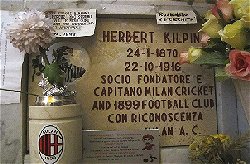 It's
not just some of the English football clubs who can trace their origins
back to cricket but one one of the most famous foreign clubs of them all
can - AC Milan. No joking! AC Milan were founded back in December 1899 by
a group of English expats led by Herbert Kilpin and Alfred Edwards as the
Milan Cricket and Football Club. Although the cricket section hasn't
lasted the passing of time the English spelling of their Milan name has.
The Milan in AC Milan is spelt the English way, rather than the Italian
spelling of Milano, in a lasting tribute to their English founders. It's
not just some of the English football clubs who can trace their origins
back to cricket but one one of the most famous foreign clubs of them all
can - AC Milan. No joking! AC Milan were founded back in December 1899 by
a group of English expats led by Herbert Kilpin and Alfred Edwards as the
Milan Cricket and Football Club. Although the cricket section hasn't
lasted the passing of time the English spelling of their Milan name has.
The Milan in AC Milan is spelt the English way, rather than the Italian
spelling of Milano, in a lasting tribute to their English founders.
*********
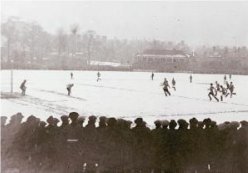 Darlington's old Feethams
ground was next-door to a cricket
ground. On December 29th 1923 Darlington's Third Division (North) match against Chesterfield couldn't be played at the Feethams because of a frozen pitch so the match was moved to the cricket
ground. A crowd of 5675 saw Darlington record a 2-1 victory. Darlington's old Feethams
ground was next-door to a cricket
ground. On December 29th 1923 Darlington's Third Division (North) match against Chesterfield couldn't be played at the Feethams because of a frozen pitch so the match was moved to the cricket
ground. A crowd of 5675 saw Darlington record a 2-1 victory.
*********
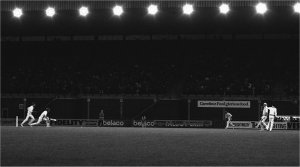
When the cricketing authorities
decided to experiment with floodlit cricket in England they had a problem
- no English cricket grounds had floodlights! So they turned to football
for help. On August 14th 1980 Chelsea's Stamford Bridge ground hosted the
first senior day-night match in England, Essex against the West Indies. An
artificial pitch was laid but a football pitch is not the ideal shape for
cricket. Being long and thin it was an easy matter to hit sixes to the
short boundaries - Graham Gooch hit a century in just 77 minutes and in
one 18-minutes spell Viv Richards scored 53 runs. A crowd of 11,073 made
it a success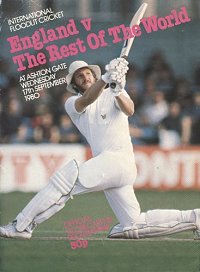 full experiment, so much so that when Chelsea played Wrexham
two days later in their opening Football League fixture of the season the
chant of 'We want cricket' was heard
during the slower moments of the game. full experiment, so much so that when Chelsea played Wrexham
two days later in their opening Football League fixture of the season the
chant of 'We want cricket' was heard
during the slower moments of the game.
A month later, on 17th September
1980 an England XI (including Botham, Gooch, Boycott and Gatting) played
the Rest of the World (including Richards, Gavaskar, Lloyd and Marshall)
in a 40-over match at Bristol City's Ashton Gate Ground. A crowd of 7925
made it a profitable venture but the experiment didn't bring a lasting
union between the sports with the major cricket grounds getting their own
floodlights.
*********
It has become less common over the
years for players to have careers in both sports so in February 2015 it
came as a surprise when Steve Harmison became manager of Ashington FC.
Steve Harmiston was a former Durham fast-bowler who had played 63 times
for England - including in an Ashes-winning series - and had taken 226 Test
wickets. Ashington Football Club were members of the Northern League and
were part of the ninth level of football in England with a normal
attendance of around 200 at their Woodhorn Lane ground. Explaining his
reasons for managing a football club rather than coaching a cricket side
he said that he had always supported his hometown club, playing for them
before he joined Durham and then training with them while he played for
Durham. But then he perhaps spoilt it a bit by saying that his first love
in football was Newcastle United! He remained as manager of Ashington
until resigning in October 2017.
*********
%20180.jpg)
Well, one thing that you
will probably never see nowadays is a
friendly cricket match between two football clubs, it often used to
happen. One example was this friendly between Manchester United and
Manchester City in 1962 but with so many foreign players in the game could
any club muster up 11 players who now even know how to play cricket? And
that hard ball - which club would allow any of their pampered stars to
risk injury playing the game?
|